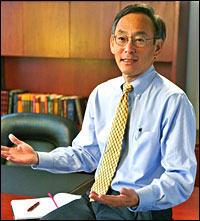
Stephen Chu.
Steven Chu, Nobel laureate and director of the Lawrence Berkeley National Laboratory, will go before the Senate Energy and Natural Resources Committee for his confirmation hearing on Tuesday, where he’s certain to be grilled about his positions on key energy and climate issues. Here’s a guide to what Chu thinks — or at least what he’s said in the past.
“Coal is my worst nightmare”
Chu is no fan of coal. “Coal is my worst nightmare,” he said repeatedly in a speech earlier this year. He says “clean coal” technologies would need to be developed in order to keep the fossil fuel in the energy portfolio in a carbon-constrained world, but notes, “It’s not guaranteed we have a solution for coal.”
As energy secretary, Chu will address the issue of government funding for coal research. The Department of Energy has been a major funder of projects to turn coal into liquid fuel, as well as the controversial FutureGen pilot program that was supposed to build the nation’s first zero-emission, “clean coal” power plant in Illinois. The Bush administration abandoned the effort after the price tag ballooned to $1.8 billion, moving the money to other projects and aiming to get carbon-capture-and-sequestration technologies in place at other power plants. But supporters (including President-elect Barack Obama) have sought to keep it alive.
Nuclear power
Chu’s comments on nuclear power have drawn fire from both nuke opponents and supporters. In a 2005 interview, he said he “absolutely” thinks the role of nuclear in the country’s energy portfolio should be increased — alarming the anti-nuke crowd.
But he’s also cautious about expanding nuclear without developing better waste-disposal systems. “The waste and proliferation issues still haven’t been completely solved,” he has said. To make nuclear power a viable option, “we’ve got to recycle the waste,” he says, as there is not enough capacity at Yucca Mountain, the site in Nevada currently being developed for long-term storage. “[I]f you take all the waste we have now from our civilian and military nuclear operations, we’d fill up Yucca Mountain. So we need three or four Yucca Mountains. Well, we don’t have three or four Yucca Mountains.”
Climate change
Chu says his realization that climate change is among the most pressing issues of our era developed over time, as did the realization that a price on carbon is needed. “In the last five or six years, I was following this as an interested citizen,” he told PBS last year. “And it became more and more apparent to me that the dangers, the potential risks of climate change were looking like they were more and more likely, and that … as a scientist, a responsible scientist, you really have to think of what you can do to help with this problem.”
Chu has stressed the importance of curbing greenhouse-gas emissions. “These are serious predictions,” he said in another interview last year, discussing the latest climate science. “It’s prudent risk management. It’s like saying, ‘Your house will burn down in the next 10 years — 50 percent probability. By the way, do you want fire insurance?'”
Chu is now a member of the Copenhagen Climate Council, an international effort to “create global awareness of the importance of the U.N. Climate Summit, in Copenhagen, in December 2009.”
“We need new technologies”
In recent years, Chu has become an outspoken advocate for carbon-neutral energy sources and policies that support their development. “I think political will is absolutely necessary,” he said in a speech at the National Clean Energy Summit in August 2008. “But we need new technologies.”
In 2007, he formed a research collaboration between the Lawrence Berkeley lab, UC-Berkeley, and energy giant BP, through which BP agreed to fund a $500 million biofuels institute at the school. The partnership was controversial both within the scientific community and on the Berkeley campus. One student group staged a mock graduation ceremony with oil-stained diplomas. The lab also secured a $125 million grant from the Department of Energy to found the Joint BioEnergy Institute.
Chu’s work at the Lawrence Berkeley lab has focused largely on advanced biofuels, artificial photosynthesis, and solar technologies. The lab has in recent years worked on creating photovoltaic cells that can be painted on to surfaces, sometimes called “solar paint,” and on technology that can convert solar energy to liquid fuel by mimicking plant photosynthesis. Through its Helios Project, the lab has worked on developing methods to “store” solar energy in the form of renewable transportation fuels derived from algae and other biomass. (See this Tom Philpott post for more on Chu’s ideas about cellulosic ethanol.)
Chu has frequently noted the importance of energy efficiency in weaning the country off fossil fuels. He has lobbied for the creation of an Advanced Research Projects Agency-Energy (ARPA-E) at the Department of Energy to fund innovative, high-tech methods to address the energy crisis. And he has advocated for an interstate electricity transmission system, paid for by ratepayers, to address the access problems associated with many renewable energy sources.


